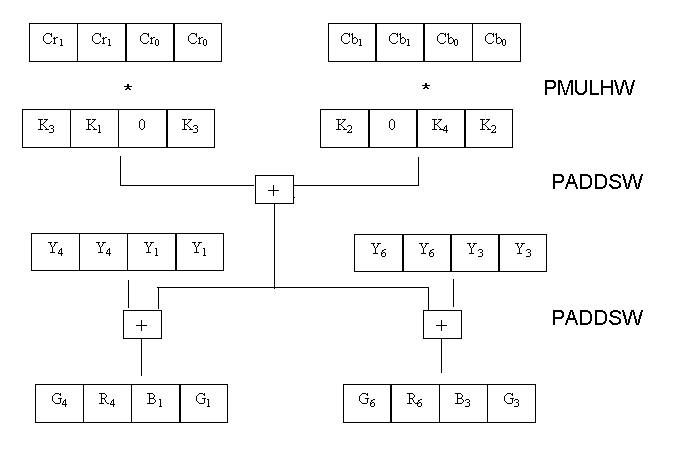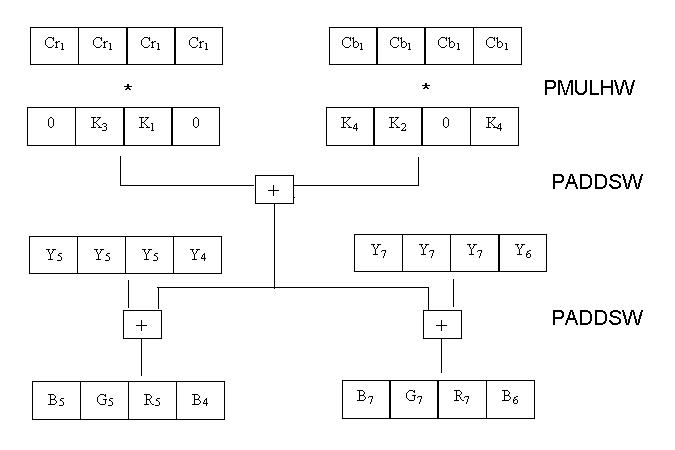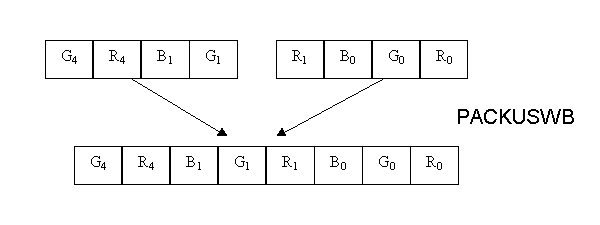JPEG Merged Upsampling and Color Conversion
Optimized for the Pentium® II Processor
|
Information in this document is provided in
connection with Intel products. No license, express or
implied, by estoppel or otherwise, to any intellectual
property rights is granted by this document. Except as
provided in Intel's Terms and Conditions of Sale for such
products, Intel assumes no liability whatsoever, and
Intel disclaims any express or implied warranty, relating
to sale and/or use of Intel products including liability
or warranties relating to fitness for a particular
purpose, merchantability, or infringement of any patent,
copyright or other intellectual property right. Intel
products are not intended for use in medical, life
saving, or life sustaining applications. Intel may make
changes to specifications and product descriptions at any
time, without notice. Copyright (c)
Intel Corporation 1997.
Third-party brands and names are the
property of their respective owners.
|
Upsampling and Color Conversion are the final steps in JPEG
decompression. Normally these 2 steps are executed independently.
Merged Upsampling/Color Conversion can be used when the chroma
components in the image are to be upsampled using a simple
replication ( i.e. box filtering ). This application note
discusses the C implementation of the merged upsample/color
conversion in the Independent JPEG Group (IJG) code and shows how
performance can be improved by using MMX(TM) technology.
Performance results for both the implementations are summarized.
The modified MMX technology implementation can be plugged
directly into the IJG code base with no code modifications.
2.0.
Merged Upsampling/Color Conversion Algorithm
The code for merged upsampling/color conversion (jdmerge.c) in
the IJG code base currently provides implementation for YCbCr
---> RGB color conversion and sampling ratios of 2h2v and
2h1v. For other cases we revert back to the general code in
jdsample.c and jdcolor.c. jdmerge.c gets executed when the
variable master->using_merged_upsample = TRUE in the file
jdmaster.c
Color Conversion is used to convert from the YCbCr ( Y =
Luminance, Cb, Cr = Chrominance) color format to the RGB ( R=
red, G = green , B = blue) color format. The equations used for
doing this are -
R = Y + K1 * Cr
G = Y + K2 * Cb + K3 * Cr
B = Y + K4 * Cb
where K1 = 1.402, K2 = -0.34414, K3 = -0.71414, K4 = 1.772
Since the eye is less sensitive to changes in
chrominance as compared to the luminance the JPEG compression
subsamples the Cb and the Cr components. In box filtering for
2h2v 2 pixels are taken from 2 adjacent scan lines and they are
averaged. The average value is used for all the 4 pixels.

Thus during JPEG decompression the same sample values of Cb
and Cr are used for 4 Y values. This helps save work during color
conversion by calculating the chroma components just once for a
group of 4 pixels.

The C implementation of merged upsampling / color conversion
precalculates the values of K1 * Cr, K2 * Cb, K3 * Cr and K4 * Cb
for all possible values of Cb and Cr and stores it in 4 separate
tables ( Cr-R, Cr-G, Cb-G, Cb-B). To avoid floating point
arithmetic the fractional constants K1, K2 , K3 and K4 are
represented as integers by scaling it up by 2 ^ 16 . The products
are divided by 2 ^ 16 with appropriate rounding to get the
correct results.
The values of Cb and Cr are read from the image to be
decompressed and are used as indices into the pre-calculated
tables. These table values are added with 4 Y values ( 2 each
from adjacent scan lines) using the equations above to compute 4
RGB pixels. So we have 4 table lookups to compute 4 pixel values.
Table lookups are costly. To eliminate the cost of table
lookups we do the actual calculations in the inner loop using
SIMD instructions provided by MMX technology. To avoid floating
point arithmetic the fractional constants are again scaled up and
represented as integers. In the C version the fractions are
scaled up 2 ^ 16. So for example K1 * Cr is represented as -
( ( K1 * 2 ^ 16 + 0.5 ) * Cr + 2 ^15 ) >> 16
Here 0.5 and 2 ^15 are added as the rounding factors. The term
( K1 * 2 ^ 16 + 0.5 ) * Cr can exceed 2 ^16. In MMX we modify the
equation so that all the multiplying factors remain under 16
bits. That way we can process 4 data items in parallel using a 64
bit MMX register. We first divide each term in the bracket by (
K1* 2^16 + 0.5 ) and multiply the whole bracket outside by the
same. So the equation becomes-

To round off the term 2^15 / ( K1 * 2^16 + 0.5 ) to a whole
number we multiply each term inside the bracket by 2^2. . So the
above equation becomes -

The terms ( 2 ^ 15 / ( K1 * 2 ^ 16 + 0.5 ) << 2 ) and (
( K1 * 2 ^ 16 + 0.5 ) >> 2) are constants and need not be
calculated every time. Also, 16 bit right shift in MMX is avoided
by using the PMULHW instruction which returns the upper 16 bits
of the product result.
From a higher level the processing of 4 data items in parallel
would look something like this-



The C implementation calls a macro every time it adds the Y
component to the constant * chroma component to clamp the result
between 0 - 255. In MMX we can achieve the same with a single
PACKUSWB instruction which packs 4 signed 16 bit values from 2
source registers into 8 unsigned bytes in the destination
register. It also clamps the values of the bytes between 0 - 255.
Thus the call to the macro is eliminated.
Performance Results were measured on a 266 MHz Pentium II
Processor for a 1024 x 768 x 24 bit test JPEG
image. The source files were compiled using Microsoft VC++
5.0 with compiler optimizations set to maximize speed.
| C Implementation |
MMX(TM) Technology Implementation |
Improvement |
| 25.4K cycles |
13.4K cycles |
1.89X |
* Legal Information © 1998 Intel Corporation








